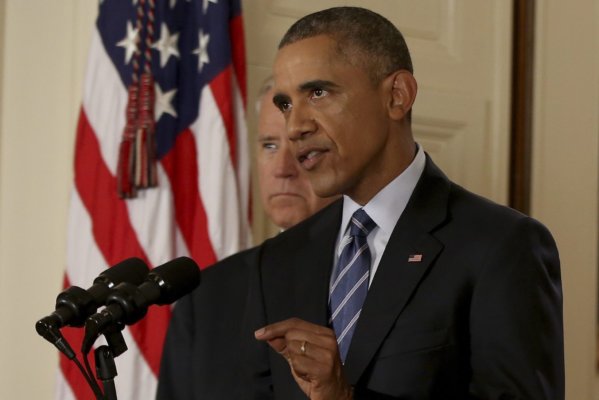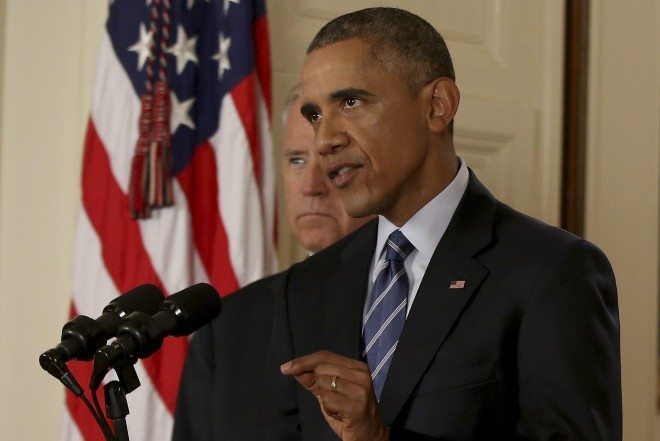Foreign affairs used to be the one area where the country supported the president to show the world that, although we might have messy domestic issues, the United States was indeed united when confronting the world.
Oh how things have changed.
I support the Iran deal for three basic reasons:
1. I assume that Iran already has a nuclear weapon or are very close to developing one. If there’s one thing that we should have learned by now, it’s that scientific knowledge cannot be stopped. If Iran doesn’t have a nuclear weapon or two at this point, they will in a few years. The key is what they are willing to do with them and what the rest of the world is willing to do about them. My firm belief is…nothing on both accounts. The Iranian government likes to talk tough about how they’re going to destroy the Great Satan and Israel, but that’s just jawboning from a regime whose clock is ticking. Because the other truth of the matter is that Israel has between 80 and 100 nuclear weapons and Iran knows that they will be turned to dust if they throw one or two weapons towards Jerusalem. That’s not likely to happen. Nuclear weapons have still only been used once in the world and rational governments know that they simply will not get away with their wanton use. Despite media reports and overblown hype from the left and the right, Iran’s government, and most importantly its people, want to live in the world. So even if they get more weapons within fifteen years, it’s important to remember that…
2. Capitalism destroys religion and always has. Think about it. The Catholic Church reached the zenith of its power on the eve of the First Crusade in 1095. It’s been downhill from there. And the reasons for its continued decline, and the decline of most western religions, is capitalism and trade and money and banking and the secular pursuit of tangible, materialistic objects that make our economic system hum. So let’s throw open the Iranian economy to the rapacious pursuit of stuff and let that do our dirty work for us. The religious leaders in Iran will try to invoke laws that attempt to limit western influence in the country as it tries to hold on to the revolutionary ideals under which it was founded, but that won’t work. Iran has a long history of capitalism and western ideals and it has a middle class that is modern and enthusiastic to join the capitalist system. Yes, economic sanctions are taking their toll on the country, but they are also inhibiting the fertile, educated minds of the very people we want to engage in trade and business.
You want a model? Look at what’s happening in China. The Communist government said that it would give its citizens the power to get rich if the citizens accepted the power of the intrusive, repressive state. That’s all well and good, but what happens when the money stops flowing? We’re seeing that now. The Communists can’t control a capitalist economy for very long and neither can a religious one. The Saudis are finding that out now as the price of oil is devastating their balance sheets. The money they earn goes into the same type of repressive religious state that the mullahs in Iran want to keep. Both states will find it extremely difficult to maintain this. There was a reason that 15 of the 19 September 11 hijackers were Saudi; there was intense governmental repression against any opposition and Al Qaeda exploited that. In Iran, the radicalism will not come from the religious as it did in the 1979 revolution. It will come from the capitalists and they will win.
This then brings us to reason number…
3. Fifteen years is a very long time. Time does seem to be flying, but think back to the world of 15 years ago. It was 2000. A Clinton was president. The Internet bubble was underway. Boris Yeltsin was drinking his way out of the Kremlin. There was a presidential election between two very boring white guys. You get the point. The world was very different. Fifteen years from now…well, who knows? But fifteen years of Iran being watched by the US, Russia, China and western European countries will have some effect on their development. Putin will likely be gone and so might the hardliners in Beijing, both of whom support Tehran. The nuclear deal puts eyes on the Iranians and allows for inspections and testing that will likely turn something up that the regime, if it lasts that long, will not be able to finesse.
The deal will now go through, either as an Obama veto or, if 3 more Democrats support the deal, as a filibustered footnote to the summer of 2015. So let’s get this out of the way and focus on North Korea and Pakistan, which are the real, irrational threats to the world today.
For more, go to www.facebook.com/WhereDemocracyLives or Twitter @rigrundfest









